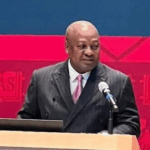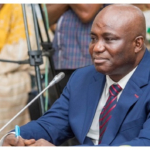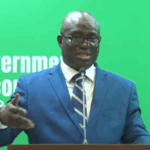
Mr President, allow me to begin by commending you sincerely. You have reignited hope in Ghanaians.
You have not yet completed every reform, but you have put in place initiatives that unmistakably signal the rebirth of the Nkrumahist dream. Your leadership shows that decolonisation is not a ceremonial phrase. It is a living national project.
Through your vision you are restoring the African Black Star personality and refusing to let Ghana remain a footnote to Western values, Western preferences and Western impositions. You are reminding us that sovereignty is power, not decoration.
Your initiatives make this clear. You have introduced the Akuko Nkitikiti poultry programme to revive community agriculture and reduce dependence on foreign imports. You have advanced the 24-Hour Economy initiative to expand productivity and create decent employment.
You have laid the foundation for the Women’s Bank to strengthen Ghanaian women financially and socially. You have initiated expansive railway and road network projects to integrate our regions and unlock our internal trade potential.
You have set in motion the transformative Accra Plains–Volta Lake Commercial Hub to position Ghana as a continental logistics and manufacturing anchor. You have revived the demand for slavery reparations, insisting that the world acknowledge its historical robbery of African nations.
You have encouraged mother-tongue instruction in schools so that Ghanaian children grow with cultural confidence instead of cultural confusion. You have promoted local rice production and consumption so that our stomachs serve our farmers, not foreign economies.
These initiatives are evidence of a leader returning Ghana to its indigenous egalitarian philosophy, the same Afrocentric worldview that guided the founding vision of the Black Star.
Yet, Mr President, as we rise internally, we must speak frankly about the world we live in. The international system is not built on morality. It is built on interest. As I argued earlier, nations are egoistic. They act only when their own needs are served. The United States acts in its interest. China acts in its interest. Russia, Saudi Arabia, Qatar, Dubai, Israel, Turkey, Iran and Cuba all act strictly in their interest.
Why then should Ghana be the exception? Why should we carry burdens that no other independent nation carries? Why should we sign agreements that stronger nations reject without hesitation?
This reality becomes evident when we examine our Defence Cooperation Agreement with the United States. Under this arrangement, American military personnel enjoy privileges on Ghanaian soil that raise serious sovereignty concerns.
Why must American soldiers use Ghana’s radio frequencies for free when ordinary Ghanaians must pay substantial fees just to operate a small radio station? Why must foreign soldiers communicate more easily on Ghanaian airwaves than Ghanaian citizens? Even more troubling is the clause that allows American forces to control access to any area they operationalise.
How is it possible that even the President of Ghana cannot automatically enter such a zone without American approval? How can a foreign soldier possess more operational authority in Ghana than the Commander-in-Chief of the Republic? What does sovereignty mean if such conditions exist on our soil?
Mr President, the danger becomes even clearer with the emerging third-country deportation arrangement. Why must Ghana receive deportees who are not Ghanaian? Why should we inherit America’s immigration crisis? If this arrangement is normal, why does the United States not sign it with China, Russia, Saudi Arabia, Qatar, Dubai, Singapore, Turkey or Israel? The answer is simple.
These countries would never accept it. They understand sovereignty. They understand dignity. They understand power. America respects them not because they obey but because they assert their authority.
This lack of balance is also evident in repatriation practices. Ghana has repeatedly accepted individuals the United States claims are Ghanaian even when documentation is weak, incomplete or contradictory.
Why should Ghana accept persons whose identity cannot be verified? Why must our immigration space serve as the final dumping point for people America wants to remove?
Mr President, extradition is even more unequal. Ghana surrenders its citizens to American courts with remarkable speed, even for crimes that occurred entirely in the United States.
Yet when Ghana requests extradition from America, the response is slow, selective or non-existent. Why must Ghana obey immediately while Ghana’s own requests gather dust? Why should our judicial sovereignty be subordinate to America’s convenience?
Much to my chagrin, Mr President, the imbalance becomes sharpest in the field of cyber security. Ghana is constantly encouraged to reorganise its national security architecture around America’s cyber vulnerabilities, as if their digital anxieties should automatically become our emergencies.
But, Mr President, let us face the hard truth. How many banks in Ghana in the past five years have lost millions due to a malware attack or a ransomware breach? How many savings and loans companies have collapsed because of a cyber assault?
How many Ghanaian universities, hospitals or public utilities have ever been shut down by ransomware the way American systems routinely are? The honest answer is almost none.
And more fundamentally, how many Ghanaian citizens are defrauded through true cybercrime? What we face in Ghana is not advanced state-level cyberterrorism. What we face is Qnet. What we face is mobile-money deception.
What we face is petty online fraud, fake investment apps, and Agradaa-style spiritual-lottery scams. These are local deception schemes rooted in economic desperation, not international cyberwar. They hurt individuals but they do not threaten the foundations of our national security, banking system or critical infrastructure.
Meanwhile, the victims of African-involved cybercrime are overwhelmingly American institutions, not Ghanaian ones. When millions vanish through crypto fraud, whose accounts are emptied? American accounts.
When retirees are scammed online, whose parents lose everything? American families. When ransomware attacks hospitals, utilities or universities, whose systems collapse? American systems. Even when Africans are involved in wrongdoing, the pain is not borne by Africa.
This is why, Mr President, the Western narrative that Africa must become the “first line of defence” in the global digital war is misleading. Business email compromise, which they frequently highlight, does not threaten Africa’s business frontier.
No Ghanaian pharmaceutical company has folded due to malware. No Ghanaian airport has been grounded by cyberattack. No power plant in Africa has been crippled by hackers. Our challenges are not digital hostilities.
Our challenges are logistical weaknesses, lack of capital, unreliable electricity, high import dependence and infrastructural gaps. None of these are cyber security problems.
Africa’s telecommunications networks have not been targets of foreign or internal cyberattacks in the way Western infrastructure has been. MTN has not collapsed from ransomware. Vodafone Ghana has not been taken offline by hostile actors.
No submarine cable landing station has been hijacked. These Western cyber security fears are foreign fears, not African realities.
Mr President, so why must Ghana divert scarce national resources to secure America’s digital environment? Why must we prioritise foreign cyber vulnerabilities over our own basic digital literacy needs? Why must we be drafted into global cyber security campaigns whose consequences do not fall on Ghanaian soil?
These cyber security pacts and cooperation agreements are decoys. They are designed to benefit foreign actors who are the actual recipients of these attacks while pretending that Africa stands to lose from a threat that is remote from her realities.
Mr President, these patterns reveal a fundamental truth. America’s problems are not Ghana’s problems. America’s wars are not Ghana’s wars. America’s immigration burdens are not Ghana’s inheritance.
America’s legal battles and cyber insecurities must not become Ghana’s responsibility. This is not hostility. It is sovereignty. It is clarity. It is the hard truth, and I will speak the hard truth to you in unlettered words.
And this is why your leadership matters profoundly at this moment. You have already placed Ghana on a path of Afrocentric renewal. The Akuko Nkitikiti initiative, the 24-Hour Economy, the Women’s Bank, the infrastructural expansion, the Accra Plains–Volta Lake Hub, the mother-tongue reforms, the reparations agenda and the commitment to local consumption all point to a Ghana preparing to stand upright again.
The task before us is simple yet sacred. We must extend this Afrocentric philosophy into our foreign policy. Ghana must stop signing agreements that turn African soil into a storage point for Western frustrations.
Ghana must stop surrendering sovereignty to satisfy external expectations. Ghana must defend its dignity with courage and shape its future with unwavering clarity.
Mr President, the world respects nations that respect themselves. You have already begun to set Ghana on a path of renewal. Now is the moment to complete that journey.
Choose Ghana fully. Defend our sovereignty unapologetically. And let the Black Star shine again as the symbol of African dignity, African confidence and African destiny.
- President Commissions 36.5 Million Dollars Hospital In The Tain District
- You Will Not Go Free For Killing An Hard Working MP – Akufo-Addo To MP’s Killer
- I Will Lead You To Victory – Ato Forson Assures NDC Supporters
Visit Our Social Media for More




